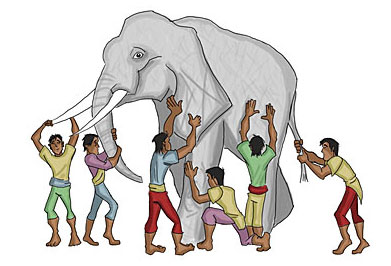Post Author: Bill Pratt
 The vast majority of us believe in some kind of supernatural realm, but more and more people are uncomfortable saying that one religion possesses more truth about the supernatural than others. We are becoming, in the US, a nation of religious pluralists. A popular mantra of the religious pluralist, according to pastor and author Timothy Keller is: “Each religion sees part of spiritual truth, but none can see the whole truth.”
The vast majority of us believe in some kind of supernatural realm, but more and more people are uncomfortable saying that one religion possesses more truth about the supernatural than others. We are becoming, in the US, a nation of religious pluralists. A popular mantra of the religious pluralist, according to pastor and author Timothy Keller is: “Each religion sees part of spiritual truth, but none can see the whole truth.”
One of the most popular and enduring illustrations used to convey this mantra is recounted by Pastor Keller:
Several blind men were walking along and came upon an elephant that allowed them to touch and feel it. “This creature is long and flexible like a snake” said the first blind man, holding the elephant’s trunk. “Not at all—it is thick and round like a tree trunk,” said the second blind man, feeling the elephant’s leg. “No, it is large and flat,” said the third blind man, touching the elephant’s side. Each blind man could feel only part of the elephant—none could envision the entire elephant. In the same way, it is argued, the religions of the world each have a grasp on part of the truth about spiritual reality, but none can see the whole elephant or claim to have a comprehensive vision of the truth.
Christians see only their slice of supernatural reality, but all the other religions likewise see their slices of supernatural reality. It is foolish to align oneself with a single religion, to make a commitment to one religion and deny the truths taught by others. They are all grasping only part of the elephant and none can claim to know the entire elephant (i.e., supernatural reality).
Does the elephant and blind men illustration prove its point? Not at all. Keller explains, “This illustration backfires on its users. The story is told from the point of view of someone who is not blind. How could you know that each blind man only sees part of the elephant unless you claim to be able to see the whole elephant?”
The person giving the illustration (the religious pluralist) is claiming to know what the blind men (followers of single religions) do not know. The religious pluralist knows that there is an elephant, even while saying that followers of single religions are blind. But how does the religious pluralist have complete knowledge of the supernatural (the elephant) if none of the followers of single religions do? Why is he able to see and they are blind?
This is a case of false humility. Every religion thinks it knows the truth about supernatural reality. All the religious pluralist does is claim that every religion is blind and that only he can see! That, my friends, is not humility at all. The pluralist should, instead of trying to convince everyone that he is above the fray, come down off his high horse (or elephant) and engage in the debate with the rest of us. All religions are making the case for their beliefs and the religious pluralist needs to do the same.
*Note: If you want to hear from one of the preeminent religious pluralists yourself, then listen to this Unbelievable? podcast featuring John Hick from Feb 2011.